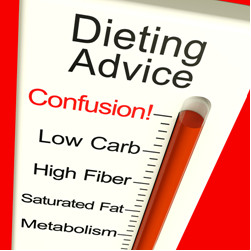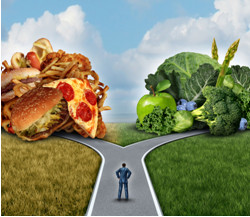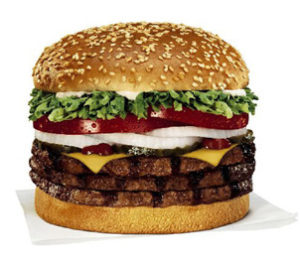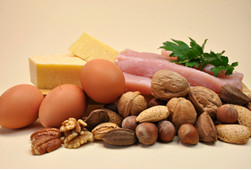Choose Healthy Foods, Not Diet Foods
Author: Dr. Stephen Chaney
 How do you lose weight without counting calories?
How do you lose weight without counting calories?
Most adult Americans gain at least a pound or two each year. That may not sound like much on a yearly basis, but over a lifetime it is huge – if you’ll pardon the pun.
Because the health consequences of weight gain are so devastating, everyone has their favorite dietary advice for keeping those extra pounds away. For some it is diet plans – low fat, low carb, paleo, Mediterranean – you name it. For others, it is counting calories or avoiding sugars of all kinds. The list goes on.
But what if all those approaches were wrong? What if we could keep our weight under control solely based on the foods we eat? A recent study seems to suggest that we just might.
How Was The Study Designed?
A group of scientists from Tufts University and Harvard decided to look at how the food choices we make on a daily basis influence our weight gain or loss over time (Smith et al, AJCN 101: 1216-1224, 2015).
 Most studies of this kind look at what foods people are eating at the time of the study and compare that to how much they weigh. This group of scientists looked at changes that people made in their diets and correlated that with how much weight they gained or lost over time.
Most studies of this kind look at what foods people are eating at the time of the study and compare that to how much they weigh. This group of scientists looked at changes that people made in their diets and correlated that with how much weight they gained or lost over time.
When you think of it, that’s the information most of us really want to know. We are less interested in why the foods we used to eat got us into trouble in the first place than we are in how the changes we make in our diet might influence future weight loss or gain.
This study combined the data from three very large, long term studies – the Nurses’ Health Study, the Nurses’ Health Study II, and the Health Professionals Follow-Up Study. Altogether that is a group of 120,784 men and women who were followed for 16-24 years. All three of these studies measured weight and evaluated dietary habits using food-frequency questionnaires every 4 years.
The scientists conducting the study measured changes in food choices and changes in weight over the duration of the studies. In analyzing the data, they looked at 3 variables: choices of protein foods, total carbohydrate, and the glycemic load (GL) of the carbohydrates.
Glycemic load is the effect on blood sugar of the carbohydrates in a food times the total amount of carbohydrate in that food. You can think of glycemic load as a measure of carbohydrate quality. Foods with low glycemic load have little effect on blood sugar. Foods with high glycemic load cause a major increase in blood sugar. You probably already know that is not a good thing.
You probably also have a pretty good idea of which foods have a high glycemic load. For example, white bread, pastries, muffins, pancakes, white rice, chocolates, candy bars, cookies, brownies, cakes, pies, and pretzels would all be examples of foods with a high glycemic load. Fruits, whole grain foods and starchy vegetables would be examples of foods with a moderate glycemic load. Vegetables and beans would be examples of foods that generally have a low glycemic load.
Lose Weight Without Counting Calories Means Foods Are More Important Than Calories?
Now let’s get to the good stuff – the results of this study. When the authors analyzed the data they found that:
- Most of the subjects did not exchange one protein food for another over the course of the study. They exchanged protein foods for carbohydrate-rich foods and vice versa.
This was a surprise. Since many experts have been recommending that people substitute chicken and fish for red meat, they had expected to see that kind of dietary shift when they analyzed the data. Apparently, people have not been listening to the experts!
- When the subjects replaced a serving of carbohydrate-rich foods with a serving of red meats, processed meats, chicken with skin or most cheeses, they gained between 0.5 to 2.3 pounds per year. Within this category, the greatest weight gain was seen when hamburgers were substituted for carbohydrates, and the least weight gain was seen when cheese was substituted for carbohydrates. These are substitutions that pack on the pounds.
 When the subjects replaced a serving of carbohydrate-rich foods with a serving of milk, peanuts or eggs, there was no net change in weight. These appear to be substitutions that are good for weight maintenance.
When the subjects replaced a serving of carbohydrate-rich foods with a serving of milk, peanuts or eggs, there was no net change in weight. These appear to be substitutions that are good for weight maintenance.
- When the subjects replaced a serving of carbohydrate-rich foods with a serving of yoghurt, peanut butter, beans, walnuts, other nuts, chicken without skin, low-fat cheese or seafood, they lost between 0.5 and 1.5 pounds/year. These appear to be substitutions that are good for weight loss.
- When they focused on carbohydrate-rich foods, replacing one serving of high glycemic load foods with low glycemic load foods was associated with one pound of weight loss per year. Simply put, if you switch from cookies, pastries and candies to fruits and vegetables, you are likely to lose weight. No surprise here. This would seem to be a method to lose weight without counting calories.
The study really got interesting when they looked at the effect of adding different proteins in the context of the carbohydrate-rich foods that the subjects were eating. For example,
- When the subjects added a serving of red meat to a diet containing carbohydrate foods with a high glycemic load, they gained an average of 2.5 pounds per year. When they added that same serving of red meat to a diet containing carbohydrate foods with a low glycemic load, they gained only around 1.5 pounds per year.
Simply put, that means eating a hamburger on a white flour bun with fries is going to pack on more pounds than a hamburger patty with brown rice and a green salad.
- The effect of glycemic load was particularly interesting when you looked at the protein foods that were good for weight maintenance overall. For example, adding a serving of eggs to a high glycemic load diet resulted in a 0.6 pound/year weight gain, while adding that same serving of eggs to a low glycemic load diet resulted in a 1.75 pound/year weight loss. The results were similar for cheeses.
- Finally, glycemic load also influenced the effectiveness of protein foods associated with weight loss. For example, addition of a serving of beans to a high glycemic load diet resulted in 0.5 pound/year weight loss, but adding a serving of beans to a low glycemic load diet resulted in a 1.5 pound/year weight loss.
New Insights From This Study
This study broke new ground in several areas. For example,
 We have heard over and over that substituting beans, chicken and fish for red meats is healthier. This is the first study I have heard of that says those same substitutions can prevent or reverse weight gain.
We have heard over and over that substituting beans, chicken and fish for red meats is healthier. This is the first study I have heard of that says those same substitutions can prevent or reverse weight gain.
- Many people advocate a high protein diet for weight control or weight loss, but many of them will tell you the type of protein doesn’t matter. This study suggests that the type of protein foods we eat are important in determining whether we lose or gain weight.
- Everyone knows that switching from white grains, pastries and candy to whole grains, fruits and vegetables will help you lose weight, but this is the first study I’m aware of that suggests those same changes will influence whether the protein foods we eat lead to weight gain or weight loss.
- Many people focus on fats and calories when trying to avoid weight gain. While this study is not really fat and calorie neutral (see below), it does suggest that if we focus on eating healthy foods, we don’t need to be counting every fat gram and every calorie. In other words, you can lose weight without counting calories by eating healthy foods.
- Finally, this study suggests that if we forget all of those crazy diets and focus on eating healthy foods, our weight will take care of itself. Not exactly a novel concept, but one worth repeating.
Can We Lose Weight Without Counting Calories?
The head author of this study stated in an interview “The idea that the human body is just a bucket for calories is too simplistic. It’s not just a matter of thinking about calories or fat. What’s the quality of the foods we are eating? And how do we define quality.” This has been picked up by the media with statements like “not all calories are created equal”.
The real message is not that fat content and calories don’t count. Nor is it that calories in some foods count more than the same calories in other foods. The take home lesson from this study should be that we don’t have to focus on fat and calories. We don’t need to jump on the latest fad diet. If we focus on healthy foods, the fat and calories tend to take care of themselves.
But, even that message is a bit too simplistic. Choosing healthy foods is not all that there is for weight control. We also need consider:
- Portion sizes. Half a chicken could easily add more calories than a small hamburger.
- How the food is cooked. Fish cooked in a cream sauce may not be any better for weight control than a slab of red meat.
- Exercise. We need to maintain muscle mass to keep metabolic rate high.
The Bottom Line
- A recent study has broken new ground and provided some new insights into how to prevent those extra pounds from sneaking up on us over time. This study evaluated how some simple changes we could make in the foods we eat can influence whether we gain or lose weight.
- One part of the study looked at the effects of replacing a serving of carbohydrate rich foods with a serving of protein rich foods. If that protein rich food were a hamburger, we could expect to gain about 2.3 pounds/year. If that protein rich food were seafood, we could expect to lose about 1.5 pounds/year. Other protein foods fall in between those extremes. The specifics are covered above.
This is a new insight. Many people advocate a high protein diet for weight control or weight loss, but many of them will tell you the type of protein doesn’t matter. This study suggests that the type of protein foods we eat are important in determining whether we lose or gain weight.
- Another part of the study looked at the effect of different carbohydrate foods based on their glycemic load (the effect they have on blood sugar). Simply replacing 1 serving of high glycemic load foods (refined grain foods, cookies, cakes, candy) with low glycemic load foods (whole grains, fruits and vegetables) was associated with a one pound/year weight loss. This should surprise no one.
- Finally, one part of the study looked at the influence of glycemic load on the effect that various proteins have on weight gain or loss. For example, adding a serving of eggs to a high glycemic load diet resulted in a 0.6 pound/year weight gain, while adding that same serving of eggs to a low glycemic load diet resulted in a 1.75 pound/year weight loss. Other examples are given above.
This is also a new insight. Everyone knows that switching from white grains, pastries and candy to whole grains, fruits and vegetables will help you lose weight, but this is the first study I’m aware of that suggests those same changes will influence whether the protein foods we eat lead to weight gain or weight loss.
- Some in the media have interpreted this study as saying that fat and calories don’t count. However, this study was not designed to be fat and calorie neutral. The real take home message from this study is that we may not need to focus so much on fat and calories. When we focus on eating healthy foods the fat and calories tend to take care of themselves.
- Even that message is a bit too simplistic. It is not enough to just focus on healthy foods. We need to consider things like portion size, how the food is prepared, and our exercise habits among other things.
- I would be the first to acknowledge that many people need strict guidelines and a well-designed diet program to lose the extra pounds that have built up over the years. However, to keep the weight off they simply need to embrace a lifestyle that includes healthy food choices and regular exercise. You can lose weight without counting calories.
These statements have not been evaluated by the Food and Drug Administration. This information is not intended to diagnose, treat, cure or prevent any disease.
